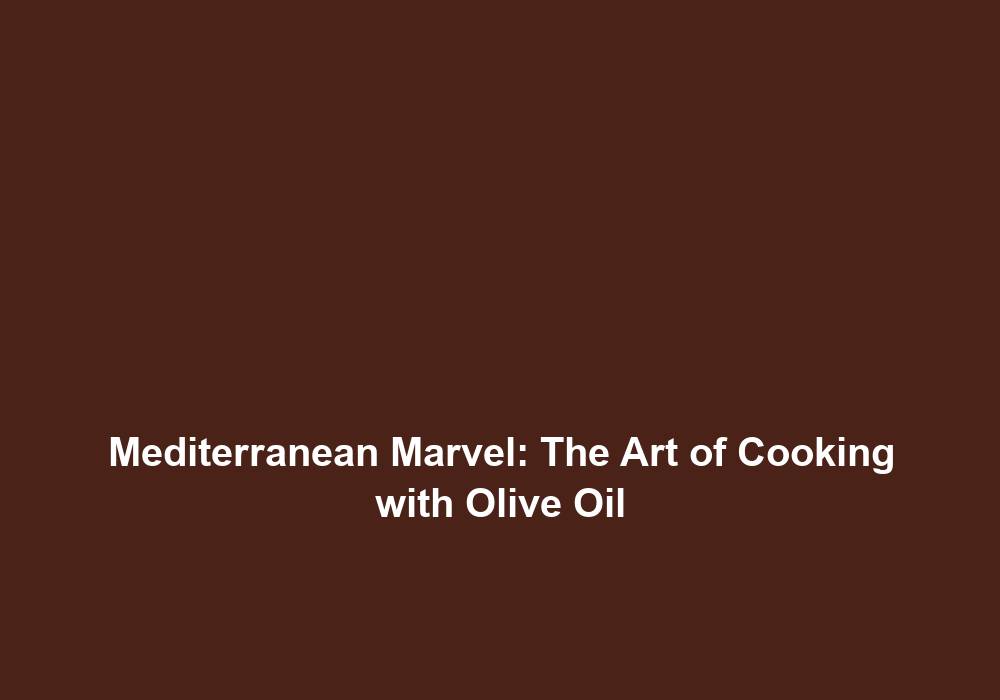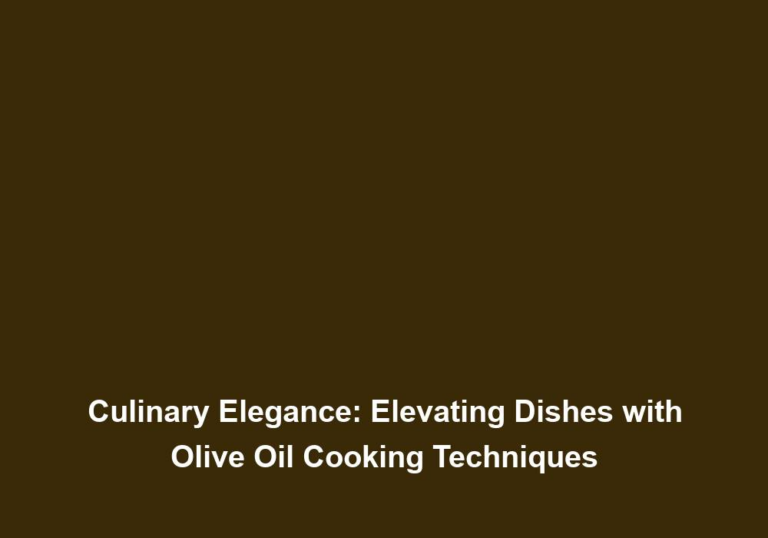Mediterranean Marvel: The Art of Cooking with Olive Oil
Olive oil, often referred to as liquid gold, is not only a staple ingredient in Mediterranean cuisine but also a key player in promoting a healthy lifestyle. With its distinct flavor, versatility, and numerous health benefits, olive oil has become a popular choice for chefs and home cooks worldwide. In this article, we will explore the art of cooking with olive oil and discover why it is an essential ingredient in Mediterranean marvels.
The Mediterranean Diet: A Treasure Trove of Health
Before diving into the culinary wonders of olive oil, it’s crucial to understand the significance of the Mediterranean diet. The Mediterranean region, encompassing countries like Greece, Italy, Spain, and Morocco, is renowned for its emphasis on fresh, whole foods, and a balanced approach to eating. This dietary pattern has been associated with numerous health benefits, including reduced risk of heart disease, diabetes, and certain types of cancer.
The Mediterranean diet is characterized by a high consumption of fruits, vegetables, legumes, whole grains, nuts, and seeds. It also includes moderate amounts of fish, poultry, and dairy products. However, the true star of this diet is olive oil, which is used abundantly in cooking and as a condiment. The Mediterranean diet’s focus on wholesome ingredients and the use of olive oil as the primary source of fat contributes to its health-promoting effects.
The Versatility of Olive Oil
One of the reasons olive oil holds such a prominent place in Mediterranean cuisine is its incredible versatility. From sautéing and roasting to dressing salads and marinating meats, olive oil is the go-to choice for countless recipes. Its distinct flavor profile adds depth and richness to dishes, elevating them to new heights.
Types of Olive Oil
To fully appreciate the art of cooking with olive oil, it’s essential to familiarize oneself with the various types available:
- Extra Virgin Olive Oil: This is the highest quality olive oil, extracted from the first press of olives without any chemical processing. It boasts a low acidity level, intense flavor, and a rich aroma, making it perfect for drizzling over salads or enhancing the taste of grilled vegetables.
Extra virgin olive oil is known for its fruity and peppery notes, which can vary depending on the olive variety and region of production. It is best used in dishes that allow its vibrant flavors to shine, such as dipping bread, enhancing the taste of fresh vegetables, or finishing off a pasta dish.
- Virgin Olive Oil: With a slightly higher acidity level than extra virgin olive oil, this type is also extracted from the first press but may undergo minimal processing. It is an excellent choice for sautéing, grilling, and baking.
Virgin olive oil offers a balance between flavor and affordability. It has a milder taste compared to extra virgin olive oil, making it suitable for cooking methods that involve higher heat. It can be used for sautéing vegetables, searing meats, or even baking desserts like olive oil cakes.
- Pure Olive Oil: Made from a blend of virgin olive oil and refined olive oil, this variety has a milder flavor and is suitable for everyday cooking methods like frying and roasting.
Pure olive oil, sometimes labeled as “regular” or “classic” olive oil, has a neutral taste profile that works well for dishes where you don’t want the oil to overpower other flavors. Its higher smoke point makes it suitable for deep frying, oven roasting, or even making homemade mayonnaise.
- Light Olive Oil: Contrary to popular belief, the term “light” refers to the oil’s mild flavor rather than its calorie content. It is typically a blend of virgin and refined olive oil, making it a versatile option for different cooking techniques.
Light olive oil is a versatile option for those who prefer a more delicate taste in their dishes. It can be used for sautéing, stir-frying, or baking, providing a subtle touch of olive oil flavor without overpowering the other ingredients. It is also a popular choice for making homemade salad dressings.
Health Benefits of Olive Oil
Apart from its culinary prowess, olive oil is packed with health benefits thanks to its high content of monounsaturated fats, antioxidants, and anti-inflammatory properties. Some of the remarkable advantages associated with incorporating olive oil into your diet include:
-
Heart Health: Olive oil’s monounsaturated fats can help lower bad cholesterol levels and reduce the risk of heart disease. Research has shown that diets rich in olive oil are associated with improved cardiovascular health and a decreased incidence of heart-related conditions.
-
Anti-Inflammatory Effects: The antioxidants present in olive oil have been shown to possess anti-inflammatory properties, which may help combat chronic diseases such as arthritis and certain cancers. These antioxidants, including vitamin E and polyphenols, help reduce oxidative stress and inflammation in the body.
-
Protective against Cognitive Decline: Research suggests that the consumption of olive oil may contribute to brain health and reduce the risk of cognitive decline in older adults. The monounsaturated fats in olive oil, along with its antioxidants, have been linked to improved cognitive function and a reduced risk of neurodegenerative diseases like Alzheimer’s.
-
Rich in Essential Nutrients: Olive oil contains vitamin E, vitamin K, and other essential nutrients that support overall well-being. Vitamin E is a powerful antioxidant that helps protect cells from damage, while vitamin K plays a crucial role in blood clotting and bone health. Additionally, olive oil is a source of healthy fats that aid in the absorption of fat-soluble vitamins.
Tips for Cooking with Olive Oil
To make the most of your culinary journey with olive oil, here are some tips to keep in mind:
-
Storage: Store olive oil in a dark, cool place away from direct sunlight to preserve its freshness and prevent oxidation. Exposure to light and heat can cause the oil to degrade and lose its flavor and nutritional value over time. Consider transferring olive oil to a tinted glass bottle or a pantry cabinet to maintain its quality.
-
Cooking Temperature: While olive oil is suitable for various cooking techniques, it has a smoke point of around 375°F (190°C). To maintain its nutritional benefits and prevent it from becoming bitter, avoid overheating it. Instead, opt for medium to low heat cooking methods like sautéing, baking, or roasting. If you need to use high heat, it’s better to choose an oil with a higher smoke point, like avocado oil or grapeseed oil.
-
Pairings: Experiment with different olive oil varieties to discover exciting flavor combinations. For example, a delicate extra virgin olive oil can enhance the taste of fresh salads, while a more robust variety may be ideal for drizzling over grilled meats. Consider the flavor profiles of the dishes you are preparing and choose an olive oil that complements the ingredients and enhances the overall taste.
-
Dressings and Marinades: Create delicious dressings and marinades by blending olive oil with citrus juices, herbs, spices, and other condiments. This will not only add flavor but also tenderize meats and infuse vegetables with delightful aromas. For a simple salad dressing, whisk together extra virgin olive oil, lemon juice, Dijon mustard, honey, minced garlic, salt, and pepper. Let the flavors meld together for a while before tossing it with your favorite greens.
-
Finishing Touch: As a finishing touch, drizzle a small amount of extra virgin olive oil over cooked dishes to enhance their flavors and add a luxurious touch. Whether it’s a pasta dish, a grilled steak, or a roasted vegetable medley, a final drizzle of high-quality olive oil can elevate the dish to new heights. Consider using a flavored olive oil, such as lemon-infused or rosemary-infused, for an extra burst of flavor.
By mastering the art of cooking with olive oil, you’ll unlock a world of culinary possibilities while reaping the numerous health benefits associated with this Mediterranean marvel.
Note: This response was generated by an AI language model. While it aims to provide helpful and accurate information, it should not be treated as professional advice. Always consult with a qualified expert or chef for specific culinary guidance.







